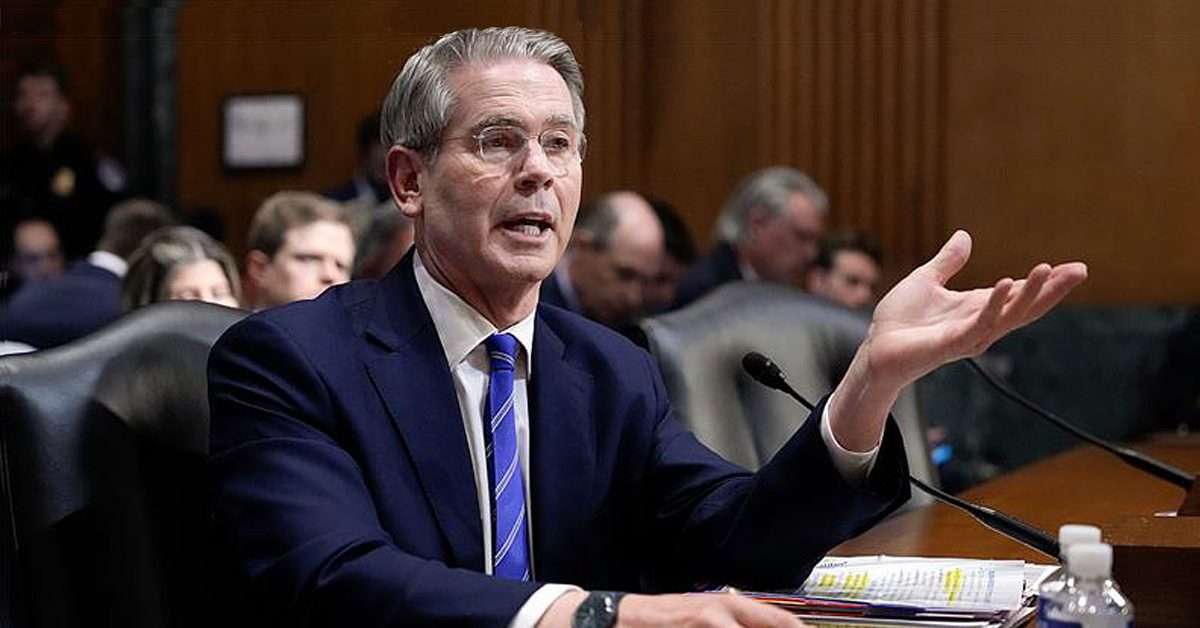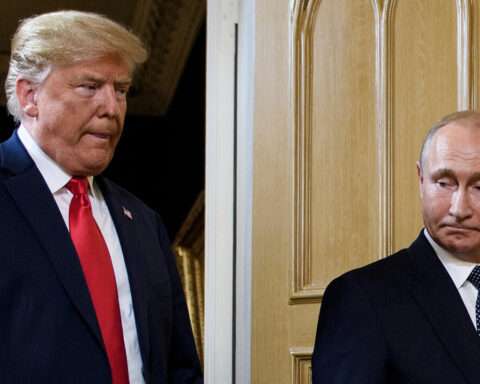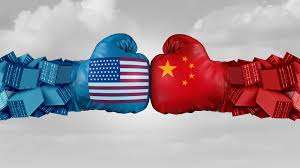Treasury Secretary Scott Bessent has stirred significant discussion with his candid admission that he “can’t guarantee” America will avoid a recession.
As a key figure in the Trump administration, Bessent’s remarks reflect a cautious outlook amid turbulent economic policies, including sweeping tariffs and market volatility. His statements, made during interviews with major media outlets, highlight the unpredictable nature of the U.S. economy as it navigates a period of transition under President Donald Trump’s leadership.
The backdrop to Bessent’s comments is a nation on edge, with Wall Street experiencing sharp declines and economic forecasts growing increasingly uncertain. As of March 19, 2025, the U.S. economy faces challenges stemming from Trump’s aggressive tariff policies and a shifting global trade landscape. Bessent, a seasoned financier with 35 years of investment experience, took the helm of the Treasury Department in late January, tasked with steering the economy through what he has termed a “detox period.” His reluctance to offer assurances contrasts with the optimism of some administration officials, underscoring the complexity of predicting economic outcomes in such a dynamic environment.
A Voice of Caution Amid Optimism
Bessent’s tenure as Treasury Secretary began with high expectations, given his background as a hedge fund manager and his alignment with Trump’s economic vision. However, his recent statements have injected a dose of realism into the administration’s narrative. During an appearance on NBC’s Meet the Press, he responded to a question about guaranteeing no recession with, “You know there are no guarantees. Who would have predicted COVID?” This acknowledgment of unpredictability stands in stark contrast to Commerce Secretary Howard Lutnick’s assertion on the same program that there’s “no chance” of a recession, revealing a divergence in tone within the administration.
Further elaborating on Fox Business with host Maria Bartiromo, Bessent doubled down, saying, “I can’t guarantee anything… But what I can guarantee you is that there is no reason we need to have a recession.” This nuanced stance suggests a belief in the administration’s policies—such as tax cuts, deregulation, and energy security—while recognizing external factors that could derail progress. His earlier comments on CNBC about a “detox period” had hinted at an adjustment phase, though he later clarified that this did not necessarily imply a recession, emphasizing a goal of a “smooth transition.”
‘I Can’t Guarantee’ America Will Avoid a Recession: Bessent’s Warning
The phrase “I can’t guarantee” has become a focal point of Bessent’s public messaging, resonating across media analyses as a rare admission of vulnerability from a Trump appointee. CNN reported on March 18, 2025, that Bessent’s refusal to rule out a recession came amid a Wall Street plunge triggered by Trump’s own reluctance to dismiss the possibility. The network noted that forecasts of a pending recession have intensified, with former Treasury Secretary Larry Summers estimating a 50% chance, a risk he said was “rising every day” due to policy uncertainty and chilled spending.
NBC News highlighted Bessent’s confidence in long-term market resilience despite short-term turbulence, quoting him as saying, “I’m not worried about the markets. Over the long term, if we put good tax policy in place, deregulation and energy security, the markets will do great.” Yet, his refusal to dismiss a recession outright has fueled debate about the administration’s ability to deliver on its promise of economic growth. The New York Times contextualized this within Trump’s broader tariff strategy, noting that stock market corrections—while deemed “healthy” by Bessent—have unsettled investors accustomed to more predictable policy signals.
The Tariff Factor and Market Volatility
Central to the recession debate is Trump’s tariff agenda, which Bessent has defended as a means to reset trade imbalances. Fox News reported Bessent’s assertion that tariffs would either force trading partners to lower barriers—boosting U.S. exports—or generate substantial revenue if they don’t comply. However, the immediate impact has been market chaos, with the S&P 500 dropping 10% from its February high, as noted by CNBC. JPMorgan economists have revised their recession odds to 40%, attributing the increase to tariffs’ potential to drag down business activity.
This volatility has not fazed Bessent, who told NBC, “Corrections are healthy. They’re normal. What’s not healthy is straight up.” He argued that preventing euphoric markets could avert a financial crisis akin to 2008, a perspective that contrasts with the New York Times’ reporting on public disapproval—56% of Americans currently disapprove of Trump’s economic handling, per a recent poll. The disconnect between Bessent’s long-term optimism and immediate economic indicators underscores the high stakes of his role.
Economic Transition or Impending Downturn?
Bessent’s reference to a “detox period” has sparked varied interpretations. On CNBC earlier this month, he described it as a necessary phase to wean the U.S. off “massive government spending,” a policy he believes was unsustainable. Yet, when pressed on whether this implied a recession, he clarified, “Not at all,” suggesting that the outcome hinges on execution. CNN pointed to declining consumer spending—down more than expected—and weak retail sales as signs that this transition might already be faltering, with tariffs exacerbating uncertainty for businesses and consumers alike.
Reuters captured Bessent’s assurance that “we are not going to have a crisis,” a statement aimed at calming fears of a full-blown financial meltdown. However, his acknowledgment of a possible “adjustment” leaves room for interpretation—could this adjustment tip into recession territory? The New York Times reported on consumer sentiment plummeting, with 54% of voters in an NBC poll disapproving of Trump’s economic stewardship, a sharp decline from his first term’s approval ratings. This erosion of confidence complicates Bessent’s mission to project stability.
Balancing Act: Policy and Perception
Bessent’s role requires navigating a delicate balance between implementing Trump’s ambitious agenda and managing public perception. His comments on Meet the Press about “robust policies that will be durable” reflect a commitment to tax reform, deregulation, and energy independence—hallmarks of Trump’s economic playbook. Fox Business highlighted his focus on reducing the federal deficit “in a responsible way,” a nod to fiscal conservatives concerned about ballooning debt, which hit a $1 trillion shortfall in February alone.
Yet, the administration’s messaging has been inconsistent. Trump himself has oscillated between warning of a “period of transition” and dismissing recession fears outright, telling reporters last week, “I don’t see it at all. I think this country is going to boom.” Bessent’s more measured tone—emphasizing sustainability over guarantees—may be an attempt to bridge this gap, but it risks amplifying uncertainty. As Reuters noted, his dismissal of stock market falls as a one-week blip contrasts with analysts like Apollo’s Torsten Sløk, who see declining consumer sentiment as a red flag.
The Road Ahead for Bessent and America
As Treasury Secretary, Bessent faces a formidable task: translating Trump’s vision into tangible results while contending with global headwinds and domestic skepticism. His 35-year career in finance lends credibility to his claim that corrections are part of a healthy market cycle, yet his inability to “guarantee” recession avoidance underscores the limits of control in an interconnected economy. The New York Times suggested that the next two months—following the start of reciprocal tariffs in April—will be critical, with Bessent urging Americans to watch how trading partners respond.
Public reaction remains a wildcard. CNN reported on businesses delaying investments and consumers tightening belts, trends that could deepen any downturn. Bessent’s optimism about long-term gains hinges on policy execution, but the short-term pain of transition—acknowledged by both him and Trump—may test public patience. Whether this period proves to be a detox or a descent into recession will define his legacy and the administration’s economic narrative.
This article draws from reporting by CNN, NBC News, Fox News, the New York Times, Reuters, CNBC, and other outlets, weaving together a comprehensive view of Scott Bessent’s pivotal role and the uncertain economic path ahead.






